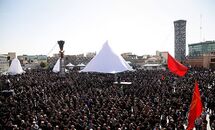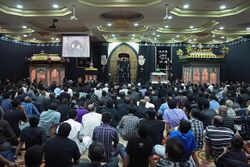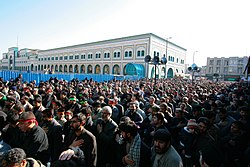Religion:Muharram
| Muharram | |
|---|---|
 Ashura procession in Iran, 2016 | |
| Native name | Template:Native name checker |
| CalendarScript error: No such module "Detect singular". | Islamic calendar |
| Month number | 1 |
| Number of days | 29–30 (depends on actual observation of the moon's crescent) |
| Significant days | Ashura |
Template:IslamicMonths sidebar Al-Muharram (Arabic: ٱلْمُحَرَّم, romanized: al-Muḥarram) is the first month of the Islamic calendar. It is one of the four sacred months of the year when warfare is banned. It precedes the month of Safar. The tenth of Muharram is known as Ashura, an important day of commemoration in Islam. For Sunni Muslims, the day commemorates the parting of the Red Sea by Moses and the salvation of the Israelites, observed through voluntary fasting and other permissible expressions of gratitude.. By contrast, Ashura is a day of mourning for Shia Muslims, who annually commemorate the death of Husayn ibn Ali, grandson of the Islamic prophet Muhammad and the third Shia imam. Husayn was killed, alongside most of his relatives and his small retinue, in the Battle of Karbala in 680 CE against the army of the Umayyad caliph Yazid ibn Mu'awiya (r. 680–683). The Shia rituals span the first ten days of Muharram, culminating on Ashura with mourning processions in Shia cities. Also in Muharram, the Aqsa mosque in Jerusalem was initially set as the direction of prayer for early Muslims.
Origins
Muharram (lit. sacred) is the first month of the Islamic calendar, with (at most) thirty days. Warfare in Muharram is forbidden, and it has been so since before the advent of Islam.[1] The word Muharram is short for "Muharram Safar" (lit. sacred Safar), which distinguishes in the ancient Arab calendar between Safar I, which was sacred, and Safar II, which was not. Over time, however, the adjective Muharram itself became the name of the first month of the year.[1]
Ashura
The tenth of Muharram is known as Ashura, an important day of commemoration in Islam. For Sunni Muslims, Ashura marks the parting of the Red Sea by Moses and the salvation of the Israelites.[2][3] Also on this day, Noah disembarked from the Ark,[3] God forgave Adam, and Joseph was released from prison, among various auspicious events on Ashura in Sunni tradition.[4] Ashura is celebrated in Sunni Islam through supererogatory fasting, and also other pious acts and acceptable expressions of joy.[4][4] In some Sunni communities, the annual Ashura festivities include carnivals, bonfires, and special dishes,[5][6] even though some Sunni scholars have criticized such practices.[4][7]
By contrast, for Shia Muslims, Ashura is a day of mourning as they commemorate the martyrdom of Husayn ibn Ali, grandson of the Islamic prophet Muhammad and the third Shia imam.[8][9] Husayn refused on moral grounds to pledge his allegiance to the Umayyad caliph Yazid ibn Mu'awiya (r. 680–683) and was subsequently killed, alongside most of his male relatives and his small retinue, by the Umayyad army in the Battle of Karbala on Ashura 61 AH (680 CE).[10][11] Among the Shia, mourning for Husayn is viewed as an act of protest against oppression, and as such a struggle for God (jihad).[12][13] Mourners also hope to secure the intercession of Husayn in the afterlife.[14][15] Ashura is observed annually through mourning gatherings, processions, and reenactments.[16][17]


Timing
Template:Hijri to gregorian calendar.svg The Islamic calendar is lunar, and months begin when the first crescent (hilal) of a new moon is sighted. Since the lunar year (of twelve lunar months) is eleven or twelve days shorter than the solar year.[18] Muharram days are different in consecutive solar years.[19]
| Islamic calendar | First day (CE) | Last day (CE) |
|---|---|---|
| 1444 | 30 July 2022 | 27 August 2022 |
| 1445 | 19 July 2023 | 16 August 2023 |
| 1446 | 7 July 2024 | 4 August 2024 |
| 1447 | 26 June 2025 | 25 July 2025 |
| 1448 | 16 June 2026 | 14 July 2026 |
Battle of Karbala
- 2 Muharram: Arrival of Husayn ibn Ali in Karbala, Iraq, in 680. On their way to the nearby Kufa, Husayn and his small caravan were intercepted by the Umayyad army and eventually forced to camp in the desert lands of Karbala, away from water and fortifications.[10]
- 7 Muharram: The Umayyad army cut off Husayn's access to the drinking water of the nearby Euphrates river.[20] Under the siege, Husayn's camp suffered from thirst and hunger in the coming days.[21][22][23]
- 9 Muharram (Tasu'a): Negotiations between Husayn and the Umayyads failed on this day in 680. The Umayyad commander Umar ibn Sa'd (d. 686) was set to attack after the afternoon prayer on Tasu'a but was persuaded to delay the confrontation until the following day.[24][10] Husayn and his men spent the night in prayer.[25][26]
- 10 Muharram (Ashura): The Battle of Karbala was fought on this day in 680. Husayn and most of his male relatives and his small retinue were slaughtered by the Umayyad army by the end of the day. After the battle, the women and children in Husayn's camp were taken prisoner and marched to the Umayyad capital Damascus in Syria.[27]
Other Islamic events
- 1 Muharram: Death of Caliph Umar (r. 634–644) by injuries from the attack of Persian slave Abu Lu'lu'a Firuz.[28] Sunnis carry rallies on 1 Muharram to commemorate Umar.[29]
- 2–10 Muharram: Most mourning rituals for Karbala take place during the first ten days of Muharram, culminating on the tenth with processions in major Shia cities.[30][31]
- 5 Muharram: Baba Farid, a Punjabi Sufi saint, died on this day in 1266. His death is celebrated (urs) for six days during Muharram, in Pakpattan, Pakistan.[32]
- 8 Muharram: In what became known as the 1782 Muharram Rebellion, on this day Bengali Muslims in Sylhet staged one of the earliest anti-British uprisings in the Indian subcontinent.[33][34]
- 16 Muharram: On this day, the Islamic prophet Muhammad set the Aqsa mosque in Jerusalem as the qibla, towards which early Muslims prayed.[1] This was superseded later by the ancient Ka'ba sanctuary in Mecca in connection with verse 2:144 of the Quran, the central religious text in Islam.[35]
- 17 Muharram: Arrival of the "people of the elephant" in Mecca, a reference to al-Fil (lit. the elephant), a surah (chapter) in the Quran.[1]
See also
Footnotes
- ↑ 1.0 1.1 1.2 1.3 Plessner 2012.
- ↑ Newman 2024.
- ↑ 3.0 3.1 Katz 2007, p. 149.
- ↑ 4.0 4.1 4.2 4.3 Reid 2011.
- ↑ Wensinck & Marçais 2012.
- ↑ Katz 2007, p. 113.
- ↑ Katz 2007, pp. 115–116.
- ↑ Aghaie 2013.
- ↑ Beverley 2011, p. 48.
- ↑ 10.0 10.1 10.2 Madelung 2004.
- ↑ Momen 1985, pp. 28–31.
- ↑ Ayoub 1978, pp. 142–143.
- ↑ Nakash 1993, p. 165.
- ↑ Blank 2001, p. 84.
- ↑ Munson 1988, p. 24.
- ↑ Calmard 1987.
- ↑ Calmard 2004.
- ↑ Seidelmann 1992, p. 577.
- ↑ Gent n.d.
- ↑ Qutbuddin 2019, p. 106.
- ↑ Veccia Vaglieri 2012.
- ↑ Pinault 2000, p. 71.
- ↑ Hamdar 2009, pp. 85–86.
- ↑ Bahramian & Bulookbashi 2015.
- ↑ Munson 1988, pp. 23.
- ↑ Sindawi 2002, p. 91.
- ↑ Momen 1985, pp. 30–31.
- ↑ Litvak 2021, p. 132.
- ↑ Dawn 2014.
- ↑ Osman 2014, p. 133.
- ↑ Momen 1985, p. 240.
- ↑ Nizami 1955, p. 1.
- ↑ Riaz 2013.
- ↑ Islam 2016.
- ↑ Wensinck & Jomier 2012.
References
- Fleet, K.; Krämer, G.; Matringe, D. et al., eds (2013). "'Āshūrā' (Shī'ism)". Encyclopaedia of Islam (Third ed.). doi:10.1163/1573-3912_ei3_COM_23855. ISBN 9789004252684. http://dx.doi.org/10.1163/1573-3912_ei3_COM_23855.
- Redemptive Suffering in Islam: A Study of the Devotional Aspects of Ashura in Twelver Shi'ism. De Gruyter. 1978. ISBN 9789027979438.
- Madelung, W.; Daftary, F., eds (2015). "Al-'Abbās b. 'Alī". Encyclopaedia Islamica. doi:10.1163/1875-9831_isla_COM_0009. http://dx.doi.org/10.1163/1875-9831_isla_COM_0009.
- Bakhsh, Khwaja Muhammad Tahir (2008) (in Urdu). Jalwa Gah-e-Dost (2nd ed.). http://urdu.islahulmuslimeen.org/urdu/books/jalwagah/h37.htm.
- Gordon Melton, J., ed (2011). "Ashura". Religious Celebrations: An Encyclopedia of Holidays, Festivals, Solemn Observances, and Spiritual Commemorations. ABC-CLIO. pp. 47–49. ISBN 9781598842050. https://archive.org/details/ReligiousCelebrations/mode/2up?q=ashura.
- Mullahs on the Mainframe: Islam and Modernity Among the Daudi Bohras. University of Chicago Press. 2001. ISBN 9780226056760.
- Calmard, J. (1987). "'Azādārī". Encyclopaedia Iranica. III/2. pp. 174–177. https://iranicaonline.org/articles/azadari.
- "Ḥosayn b. 'Ali ii. In Popular Shi'ism". Encyclopaedia Iranica. XII/5. 2004. pp. 498–502. https://iranicaonline.org/articles/hosayn-b-ali-ii.
- Gent, R.H. van (n.d.). "The Umm al-Qura Calendar of Saudi Arabia". https://webspace.science.uu.nl/~gent0113/islam/ummalqura.htm.
- "Jihad of words: Gender and contemporary Karbala Narratives". The Yearbook of English Studies 39 (1–2): 84–100. 2009. doi:10.1353/yes.2009.0016. https://muse.jhu.edu/article/814313/summary.
- The Birth of the Prophet Muḥammad: Devotional Piety in Sunni Islam. Routledge. 2007. ISBN 9780203962145. https://archive.org/details/TheBirthOfTheProphetMuhammadByMarionHolmesKatz/mode/2up.
- "Ḥosayn b. 'Ali i. Life and Significance in Shi'ism". Encyclopaedia Iranica. XII/5. 2004. pp. 493–498. https://www.iranicaonline.org/articles/hosayn-b-ali-i.
- Islam, Emad Ullah Shahidul (19 October 2016). (in bn)Bangladesh Pratidin. https://www.bd-pratidin.com/editorial/2016/10/20/178131.
- An Introduction to Shi'i Islam. Yale University Press. 1985. ISBN 9780300035315.
- Islam and Revolution in the Middle East. Yale University Press. 1988. ISBN 0300046049. https://archive.org/details/islamrevolutioni00muns/mode/2up.
- "An Attempt to Trace the Origin of the Rituals of 'Āshūrā'". Die Welt des Islams: 161–181. 1993. https://www.jstor.org/stable/1570949.
- "'Āshūrā'". Encyclopedia Britannica. 24 August 2024. https://www.britannica.com/topic/Ashura-Islamic-holy-day.
- Female Personalities in the Qur'an and Sunna: Examining the Major Sources of Imami Shi'i Islam. Routledge. 2014. ISBN 9781315770147.
- Nizami, Khaliq Ahmad (1955). The Life and Times of Shaikh Farid-u'd-din Ganj-i-Shakar. Department of History, Aligarh Muslim University. https://books.google.com/books?id=cuAbAQAAMAAJ.
- Hambly, G., ed (2000). "Zaynab bin 'Ali and the Place of the Women of the Households of the First Imāms in Shī'īte Devotional Literature". Women in the Medieval Islamic World: Power, Patronage, and Piety. Macmillan. ISBN 9780333800355.
- Bearman, P.; Bianquis, Th.; Bosworth, C.E. et al., eds (2012). "al-Muḥarram". Encyclopaedia of Islam (Second ed.). doi:10.1163/1573-3912_islam_SIM_5426. ISBN 9789004161214. http://dx.doi.org/10.1163/1573-3912_islam_SIM_5426.
- Korangy, A.; Rouhi, L., eds (2019). "Orations of Zaynab and Umm Kulthūm in the aftermath of Ḥusayn's Martyrdom at Karbala: Speaking Truth to Power". The "Other" Martyrs: Women and the Poetics of Sexuality, Sacrifice, and Death in World Literatures (First ed.). Harrassowitz Verlag. pp. 103–132. doi:10.2307/j.ctvrnfq6q. ISBN 9783447198790. https://doi.org/10.2307/j.ctvrnfq6q.
- Fleet, K.; Krämer, G.; Matringe, D. et al., eds (2011). "'Āshūrā' (Sunnism)". Encyclopaedia of Islam (Third ed.). doi:10.1163/1573-3912_ei3_COM_23081. ISBN 9789004203532. http://dx.doi.org/10.1163/1573-3912_ei3_COM_23081.
- Riaz, Ali (23 July 2013). Islam and Identity Politics Among British-Bangladeshis: A Leap of Faith. Manchester University. ISBN 978-0719089558.
- Seidelmann, P. Kenneth, ed (1992). Explanatory Supplement to the Astronomical Almanac.
- "The Image of Ḥusayn ibn 'Alī in Maqātil Literature". Quaderni di Studi Arabi 20/21: 79–104. 2002. https://www.jstor.org/stable/pdf/25802958.pdf.
- Bearman, P.; Bianquis, Th.; Bosworth, C.E. et al., eds (2012). "(al-)Ḥusayn b. 'Alī b. Abī Ṭālib". Encyclopaedia of Islam (Second ed.). doi:10.1163/1573-3912_islam_COM_0304. ISBN 9789004161214. http://dx.doi.org/10.1163/1573-3912_islam_COM_0304.
- Bearman, P.; Bianquis, Th.; Bosworth, C.E. et al., eds (2012). "Ka'ba". Encyclopaedia of Islam (Second ed.). doi:10.1163/1573-3912_islam_COM_0401. ISBN 9789004161214. http://dx.doi.org/10.1163/1573-3912_islam_COM_0401.
- Bearman, P.; Bianquis, Th.; Bosworth, C.E. et al., eds (2012). "'Ās̲h̲ūrā'". Encyclopaedia of Islam (Second ed.). doi:10.1163/1573-3912_islam_COM_0068. ISBN 9789004161214. http://dx.doi.org/10.1163/1573-3912_islam_COM_0068.
External links
 "Muharram". New International Encyclopedia. 1997.
"Muharram". New International Encyclopedia. 1997.
Template:IslamicMonths Template:Public holidays in Indonesia Template:Public holidays in Malaysia
 |
